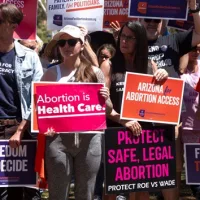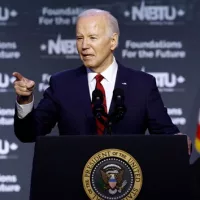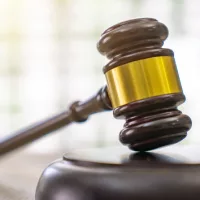 Stockbyte/Thinkstock(WASHINGTON) — It’s the one-year anniversary of a major Supreme Court decision on gay marriage. And a lot can happen in a year.
Stockbyte/Thinkstock(WASHINGTON) — It’s the one-year anniversary of a major Supreme Court decision on gay marriage. And a lot can happen in a year.
In United States v. Windsor, the justices didn’t squarely address the issue of a state ban on gay marriage. Windsor, written by Justice Anthony Kennedy, invalidated part of a federal law that denied benefits to same-sex couples legally married in their states. But since June 26, 2013, federal judges have adopted Kennedy’s equal protection language to strike down bans across the country.
The latest ruling came Wednesday when the 10th Circuit Court ruled that Utah’s ban on gay marriage is unconstitutional.
Look at the statistics: A year ago, same-sex couples could marry in 10 states and Washington, D.C. Today, that number has ballooned to 19 states and D.C. Almost 44 percent of the country lives in states where same-sex marriage is legal, according to Human Rights Campaign.
The Supreme Court ruling fueled a social movement of such rapid pace that even veterans of social movements were taken by surprise:
Here’s what Supreme Court Justice Ruth Bader Ginsburg, who as a young lawyer fought the battle against gender discrimination, said recently in an interview with the Wall Street Journal: “I haven’t seen a social change that rapid — ever.”
James Esseks, director of the American Civil Liberties Union’s Lesbian, Gay, Bisexual, Transgender and AIDS Project, says, “Across the country, more and more Americans are embracing the truth that their friends, family and neighbors in same-sex couples deserve the protection and dignity that only come with marriage.” Esseks was one of the lead lawyers in Windsor.
Some examples of court opinions include this language:
“The Supreme Court has not expressly reached the issue of whether state laws prohibiting same-sex marriage violate the U.S. Constitution,” wrote U.S. District Court judge Terence C. Kern for the Northern District of Oklahoma. But then he cited several cases culminating with Windsor and said, “This court knows a rhetorical shift when it sees one.”
“Any regulation adopted by a state, whether related to marriage or any other interest, must comply with the Constitution of the United States,” wrote U.S. district court judge Robert J. Shelby for the District of Utah Central Division.
“In light of Windsor and the many decisions that have invalidated restrictions on same-sex marriage since Windsor, it appears that courts are moving toward a consensus that it is time to embrace full legal equality for gay and lesbian citizens,” wrote U.S. district court judge Barbara B. Crabb for the Western District of Wisconsin.
The frantic pace of the rulings has also led to a phenomenon the ACLU calls “window period” marriages. Those are marriages that occurred between the issuance of a court order striking down a ban, and the issuance of a stay. In Utah, for example, about 1,300 licenses were issued and 1,000 marriages occurred after the state’s ban was struck, according to the ACLU. Only days later did the Supreme Court halt further marriages pending appeal.
Lawyer David Austin R. Nimocks, of the Alliance Defending Freedom, is defending marriage laws in Arizona, Oklahoma, Pennsylvania and Virginia. In a recent brief in the Virginia courts he writes: “Marriage laws have been, and continue to be, about the pragmatic business of serving society’s child-centered purposes, like connecting children to their mother and father, and avoiding the negative outcomes often experienced by children raised outside a stable family unit led by their biological parents.”
Nimocks’ case, in the Fourth Circuit Court of Appeals, is currently being considered. He hopes that the tide will change in gay marriage rulings at the appellate level.
The 10th Circuit opinion this week that struck down Utah’s gay marriage ban, which was stayed pending appeal, represents the first appellate court ruling since Windsor. It could also represent the first step back to the Supreme Court on the big question: Can states ban gay marriage?
Follow @ABCNewsRadio
Copyright 2014 ABC News Radio















